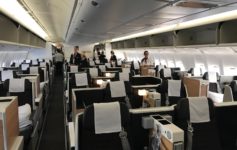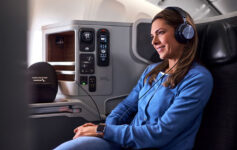Delta Air Lines has announced an “enhancement” to their Skymiles award chart, raising the price of saver business class redemptions up to 25% in some markets. Citing abuse, the carrier also announced an end to the ability to hold award reservations starting on September 09, 2013. The option to cancel and award reservation without penalty up to 24 hours after booking will remain. The new award chart is effective immediately, but only for award travel on or after June 01, 2014.
Amazingly, Delta justifies the price increase by touting their own product improvements:
Many of you have experienced first hand our significant investments in products over the past several years. In June 2014, we will be the only U.S. carrier to offer full flat-bed seats with direct aisle access in Business Class across our entire wide-body fleet. Our premium cabins will also soon offer new, on-demand in-flight entertainment options and we are in the process of adding in-flight Wi-Fi on our long-haul international aircraft scheduled to be complete by 2015. We’ve also partnered with premium brands Westin and Tumi on new bedding and amenity kits and we’re introducing new dining options.
As a result, we’ve recognized the need for adjustments to our low mileage redemption levels for select international Award Tickets in BusinessElite. The mileage redemption adjustments are effective today for Award Travel on or after June 1, 2014. Please check our Award charts for updated mileage levels later today.
Of course, Delta space is so rarely available at the low-level anyway and Delta’s three-tier structure is driven by supply and price, not product. Most low-level bookings on Delta are on partners, partners that have not updated their hard or soft product. And Delta’s “significant investments” still fall short of the competition. United Airlines, for example, has lie-flat beds on 100% of its longhaul fleet and charges 25% less for a trip to Europe with no fuel surcharges if you originate outside of the United States. I cannot understand why Delta won’t just say, “Folks, we have too many miles floating around and that is a liability. To help alleviate that liability we are going to charge you more for the same thing.” Their excuse for the increase in price is laughable.
Here’s the key changes to the award chart, only affecting the low level / business class category:
USA/Canada to Europe
Current: 100,000 miles roundtrip
From 01 June 2014: 125,000 miles roundtrip
USA/Canada to Middle East
Current: 120,000 miles roundtrip
From 01 June 2014: 140,000 miles roundtrip
USA/Canada to Southern South America
Current: 100,000 miles roundtrip
From 01 June 2014: 125,000 miles roundtrip
USA/Canada to Asia
Current: 120,000 miles roundtrip
From 01 June 2014: 140,000 miles roundtrip
USA/Canada to Australia
Current: 150,000 miles roundtrip
From 01 June 2014: 160,000 miles roundtrip
USA/Canada to Africa
Current: 120,000 miles roundtrip
From 01 June 2014: 140,000 miles roundtrip
USA/Canada to South Africa
Current: 140,000 miles roundtrip
From 01 June 2014: 160,000 miles roundtrip
The effects of this change are already being felt. I’ve been working on a trip for two clients to Tanzania and the Seycehelles using their hard-earned Delta miles. For two years they have saved up 120,000 Skymiles apiece for a safari and some relaxing time on the beach. Now, their 120,000 Skymiles will no longer buy them a business class ticket. Just like that, with no notice at all.
The silver lining in this, if there is any, is an indication that at least for now, we will not have an explicit revenue-based award redemption scheme. I suspect Delta found the logistics of such an award scheme were much more difficult than previously imagined.
Another positive impact might be the return of Air France/KLM award space bookable with Skymiles, which would be a tremendous benefit. It still is not clear whether Delta cut off Air France/KLM or vice-versa, but booking both economy and business longhaul flights, particularly to/from North America, has been near-impossible the last several months. There is an odd phenomenon right now in which Air France/KLM release space about 330 days out to their partners, including Delta, but that space is not bookable by their own Flying Blue loyalty members, who can only book 10 months in advance. I’ve noticed that these Air France and KLM flights are bookable using Skymiles during a 1-2 month window 10-11 months in advance of travel, but then the availability promptly disappears when the flights later become bookable with Flying Blue.
Early signs indicate that space after 01 June 2014 that is bookable with Flying Blue (and Alaska Airlines) is now bookable on delta.com as well.
If Delta actually releases more saver 125K r/t space and again has access to generous award space on KLM and Air France, the average consumer will benefit from this update to the award chart—it is a compromise, but one that hopefully will give consumers more options and promote the avoidance of costly medium and high level award redemptions.
Award Holds
Curtailing the ability to place award reservations on hold will make my business more difficult. I book a lot of ticket with Delta Skymiles for clients and I am one of those people who liberally use the hold feature, but I would never characterize my use as “abuse”. Most itineraries I place on hold end up being modified over the phone and ultimately booked. By setting up reservations with passenger names in advance, I can shave at least five minutes off from every phone call. In time when so many Skyteam partners require a call to Delta to book, taking away this feature is nothing but an unreasonable move by Delta to encourage consumers to accept a less valuable outcome. Delta’s horrid online award booking engine does not make it easy to book awards and as I highlighted before, Delta’s intent seems to be to NOT train their agents, making it impossible for all but the most savvy to book saver awards.
But while the ability to hold awards may be taken away for consumers, it will still be there in the background. Any airline can create a PNR without immediately ticketing and hold the space for at least a short period. Much like the Delta of old that did not offer online holds and only offered telephone holds for accounts with insufficient mileage, my guess is agents will still be able to hold itineraries, at least for a short period, while you transfer AMEX points to Delta while still on the line with the agent.
* * *
Yet again this latest devaluation demonstrates that miles and points are a depreciating asset. Use them now, do not store great stockpiles, and realize that Delta is just the pioneer—I believe we are on the cusp of a round of cutbacks unlike that we have ever seen. With six legacies now down to four and soon to be three if the American/US Airways merger overcomes the ire of the U.S. Justice Department, our favorite airlines are finding themselves profitable and lacking an incentive to offer the generous frequent flyer benefits we have enjoyed for so many years.




Excellent analysis and observations. Thank you for this. Hugely disappointing to read and frankly, another data point proving why I should stick with United and Star even after I move to Minneapolis.
will this impact redeemption on all skyteam carriers or just the awards on DL metal?
@naif: All Skyteam carriers.
Delta miles quoted in article are for EACH leg of round trip, not a full round trip ticket. Currently a Europe trip from US requires 200,000 total miles for 1st class. I know because I’m trying to book with miles for an April 2014 trip. I assume the new mileage chart will require 250,000 total miles, 125,000 each way. Time for a Capital One card maybe?
What about change of cabin class for Delta; would there be a fee? I want to book an international itinerary in business and one segment is in Korean Air coach right now. Say a week prior to departure, if a business seat opens up on Korean Air, can I change that coach segment to business without a fee?
@Thanh: You can -if- you already paid for it, which is a little tricky with Delta’s opaque pricing system.
Say you book a mid-tier business on Delta from LAX-NRT and coach on Korean from NRT-ICN. You are charged separately for the NRT-ICN in coach and if business opens, you must pay the change fee.
Whereas, if you are booked in “low” business on Delta from LAX-NRT and coach on Korean to ICN, you are charged the low business from LAX-ICN and can move up the Korean segment to business for no fee.
Does that make sense?